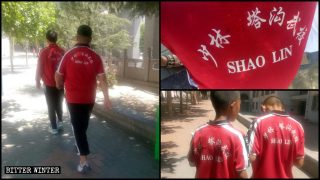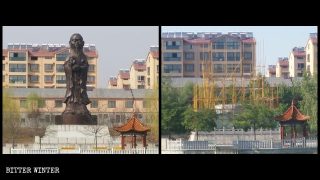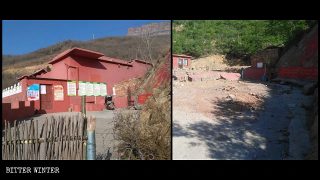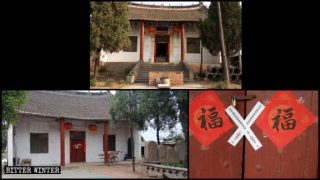The Chinese authorities’ crackdown on Buddhist venues and symbols is intensifying, even protected historical and cultural sites are not spared.
Shen Xinran
In China’s war against religious belief, more and more reminiscent of the Cultural Revolution, even the country’s traditional religions of Buddhism and Taoism are not safe from persecution. Numerous temples have been shut down or destroyed, and religious statues have been forcibly demolished, sometimes by using explosives. Bitter Winter continues to receive shocking reports indicating that the campaign to suppress Buddhism is escalating.
Classified as a national 4A-level scenic area, the Bodhi Island Scenic Area, also known as “Buddhist Kingdom on the Sea,” is located in Bohai Bay to the southeast of Tangshan city in north China’s Hebei Province. As early as February 2001, the area was designated as a historical and cultural site protected by Hebei Province.
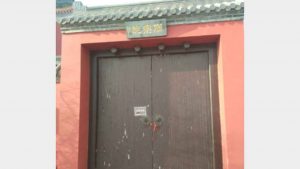
On February 15 this year, the authorities sealed off multiple buildings on Bodhi Island, including the temples of Chaoyin and Chaoyang, on the grounds that government funds cannot be used for the construction of Buddhist venues. The authorities also ordered the monks at the two temples to leave the premises within one week.
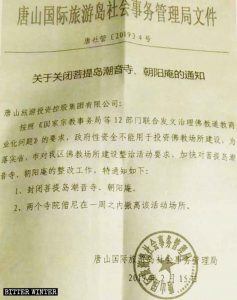
Since the monks left, the sounds of the morning and evening bells and the chanting of Buddhist sutras that once echoed daily from the temples have disappeared.
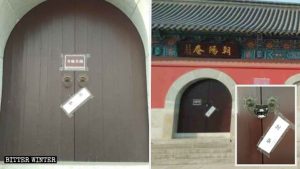
The same month, a Buddhist temple in Yicheng district of Zaozhuang city, in east China’s Shandong Province, built at the cost of more than 10 million RMB (about $1,492,600), was also sealed off. The local Religious Affairs Bureau posted closure notices throughout the temple and later ordered workers to build a wall, sealing off the temple’s entrance to prevent believers from burning incense. Police officers were ordered to patrol and inspect the temple regularly.
Meanwhile, authorities in Datianzhuang township, in Shandong’s Feixian county, have forcibly repurposed Guanyin Temple to turn it into the “Yuhuangtai Academy of Painting and Calligraphy” on the grounds that private construction of temples is not allowed.
An eight-meter-tall outdoor Guanyin statue in the temple’s courtyard was completely covered with marble slabs. All other statues inside the temple were barricaded with steel pipes and plywood, and the authorities prohibited people from entering the temple to worship and make offerings.
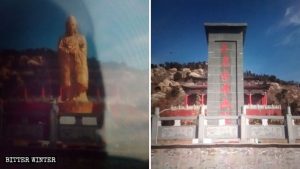
The Religious Affairs Bureau shut down a temple in Beigongzhuang village, under the jurisdiction of Feicheng town, Feixian county, and smashed a large incense burner at its entrance.
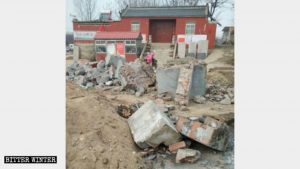
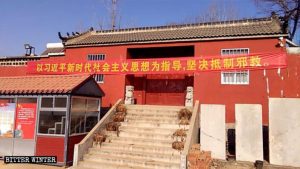
Doushuai Buddhist Temple, located in Xiushui county, under the jurisdiction of Jiujiang city, in central China’s Jiangxi Province, was also subjected to an equally harsh crackdown. In November 2018, local town government officials ordered the owner of the temple to dismantle an 18-meter-tall outdoor bronze Guanyin statue for having been built without government approval.
“If we didn’t dismantle the Guanyin statue ourselves, the government would tear it down and destroy it, and the entire temple would also be demolished,” said one of the temple’s monks.
To protect the temple from being demolished, the temple’s owner hired people to dismantle the bronze Guanyin statue, which had cost more than one million RMB (about $149,260) to build.
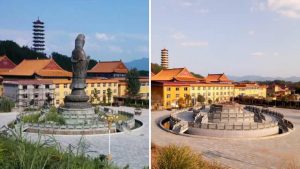
“We have Buddha in our hearts. Buddha is the greatest, but the government wants us to follow the Party; otherwise, there will be trouble for us,” one believer said.
“Under the CCP regime, there is no law to speak of; those in power dictate the law. If you try to reason with them, they will label you as “counter-revolutionary” and let you die, so that you can never open your mouth. Even if you have a permit for your temple, they will find other excuses to tear it down. The common people have no place to go to reason,” said a local elderly monk.
source:BITTER WINTER/Shen Xinran
